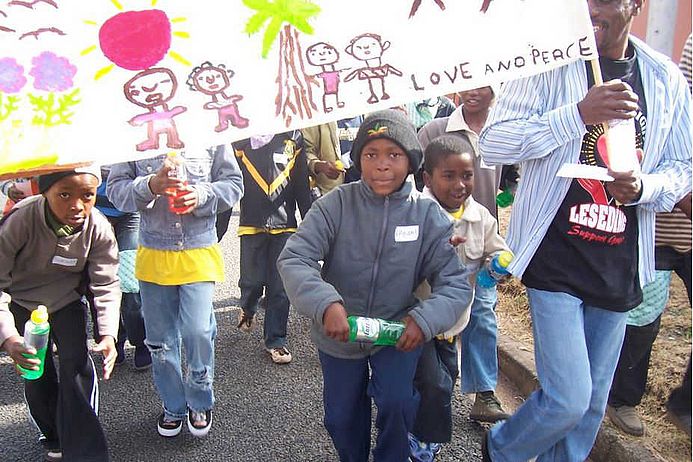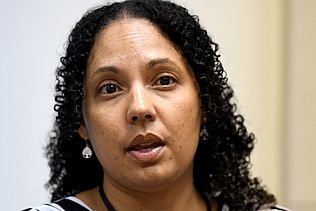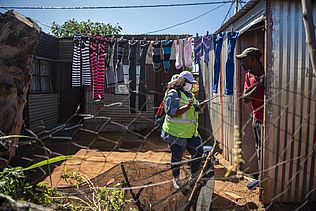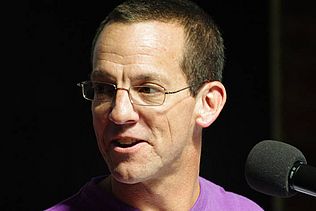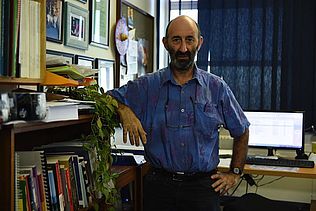Mpumi Zondi
Trauma has been defined as “a psychologically distressing event that is outside the range of usual human experience”[1]. The American Psychological Association, a mental health authority, similarly describes trauma as “an emotional response to a terrible event like an accident, rape or natural disaster”[2]. These and many other definitions of trauma seem to make the following assumptions that in turn influence trauma counselling models:
- That the traumatic “event” happens to a person who has a reasonably stable life, and this event will therefore shatter their worldview and beliefs and stability.
- If the event is said to be outside of “normal” human experience, then the symptoms of trauma are often understood to be normal reactions to an abnormal situation.
- Counselling models of trauma need to be brief, time limited and have very specific phases or steps that must be worked though. This also assumes that the impact of the trauma can be worked through within that limited time.
- Counselling focuses on working towards a return to safety or normality. The ultimate objective is for the client to regain mastery or a sense of control over their lives. The assumption is that the client till return to safety and “normality”.
- The language used is that the client is a trauma survivor and therefore the assumption is that they have survived, and that the storm is over.
The objective of this discussion is to critically analyse the above assumptions underpinning mainstream models of trauma on the basis of our work at Sophiatown Community Psychological Services. Drawing on our own experiences and the realities of our clients, we are gaining the courage to openly suggest that trauma work needs to be re-conceptualized, especially for our African contexts.
As an organization we are committed to contribute to an alternative way of thinking about trauma. Our commitment is not only to continue to have internal reflections and conversations about this re-conceptualization of trauma but to also collaborate with other practitioners in the psychosocial field to influence this change. We ultimately have a vision of influencing a theory building process by developing, in collaboration with other African practitioners, models of trauma that are meaningful for our African contexts.
The general context of our clients
Sophiatown Community Psychological Services (SCPS) is a Non-Governmental Organisation (NGO) that provides culturally and socially appropriate forms of psychosocial support to economically disadvantaged individuals, families and communities in distress in some parts of Johannesburg, South Africa. We offer this psychosocial support through various forms of intervention. Individual counselling, group therapy, talking and learning groups for parents, girls and boys teenagers community outreach, training and advocacy.
Poor and marginalized
Our clients are South Africans of different races, and refugee foreign nationals from other African countries. Most of our clients are poor and have no visible means of economic support. The few who have some form employment work as part time domestic workers or work in jobs where they earn a sub –minimum wage. Others earn their income through selling recycled materials, while others are hawkers who are continuously harassed by the city police.
Our clients in the Sophiatown East offices live in overcrowded houses and flats in and around the main Central Business District and are exploited by landlords who charge very high rental fees. Most of these clients are women; many of them come from other African countries and face discrimination on that basis. The clients that we serve in the Sophiatown West office are from the township of Soweto and from the surrounding informal settlements/slums. Those who live around the Sophiatown West offices often live in council flats where there is drug and alcohol abuse and high crime.
The clients from the township and informal settlements rarely own the places they live in. In the township they live mostly with the extended family in a family home that is often a source of conflict in the family. We also have students who occasionally use our services, as we are based not far from a university. At SCPS West, we provide services from our offices but also have community counsellors and social worker that take counselling services to the community by going out to various schools and community centres on a weekly basis. This also includes a lot of home-visits by our social workers to do assessments of the social problems presented by clients and work with clients’ families in a holistic manner.
Exposure to HIV/AIDS, domestic violence and violent sexual crimes
Most of our clients are either affected or living with HIV/AIDS. With some of our clients from the informal settlements and slums their poverty contributes to their infections as they sometimes get into transactional relationships where they get financial support in exchange for sex. These relationships tend to be characterized by domestic violence, violent sexual crimes and substance abuse. The impact of this is instability in family life, child neglect and abuse.
We have community workers who walk through these neighbourhoods offering emotional and practical support to terminally ill clients who are unable to get to our counselling centre. Gender-based violence is an everyday reality for women and especially girl clients. In the schools where we offer counselling services, young people are often victims of gang rape. Often their drinks get spiked at parties and they are then raped, further exposing them to risks of contracting HIV.
Layers of discrimination
Our clients face discrimination at different levels. They are discriminated as women, as foreigners as people living with HIV/AIDS as unemployed men, as poor people and also as children. Our women clients have a burden of caring for their children. Refugee clients face major adjustment issues as well as trauma related stress, which is rooted in their experiences of being refugees living in a hostile city. The discrimination itself comes from various actors: sometimes from their own families, communities and unfortunately also from public institutions such as the clinics, hospitals, social security offices, Department of Home Affairs and schools. At times we have to intervene on their behalf by doing advocacy on our own or through other advocacy organizations to defend their basic rights.
Thembi’s story
The following story of a young woman client is illustrative of the complexities that we work with in counselling clients at SCPS, and provides insight into the limitations of mainstream trauma counselling models as effective ways to journey with our clients.
Thembi[3] is a 21-year-old client that started using our counselling service at the beginning of 2013. She was highly distressed after being drugged and raped by her male cousin in 2011. Thembi fell pregnant as a result of this rape. Her attempts to terminate the pregnancy were unsuccessful and at the beginning of her counselling process her baby was already 6 months old.
Thembi lives with her mother her two siblings baby in a shared outside room at the “family house” in Soweto. When she disclosed this horrific rape to her family their reaction was not supportive as they didn’t believe her, with the exception of her mother.
The clients’ context
Thembi is part of a generation in South Africa known as “the born free generation”—born towards and at the end of apartheid in 1994. This is a generation that was born into hopes of a better quality education, economic freedom and all other promises that came with the democratic South Africa. Some of these promises haven’t been realized by a lot of young people in our country, and most of them have become disillusioned with our democracy.
Extreme daily stressors related to material need are a reality for our clients. Although Thembi completed her education up until the end of secondary school, she could not go further with her studies and plans to become an IT specialist given that she cannot afford the fees. The client works as a waitress in a touristy area of Soweto. Although the restaurant is busy and is doing well, the client only earns 800 South African Rand (approximately 75 US Dollars) per month. Since the birth of her baby she has been forced to make contact with her rapist seeking financial support for the baby. This further complicated her relationship with the rapist. Thembi also has difficulties in securing childcare, which means that she is sometimes late to her counselling sessions.
Underlying psychological issues
Thembi has an ongoing distress because of the unwelcomed pregnancy. Her baby was a constant reminder of the rape and the trauma and she found difficulty connecting and binding with her child. She felt conflicted as the baby also became an unwelcome interruption in her young life. She was so overwhelmed and in despair and tried committing suicide twice during her pregnancy but did not succeed.
Thembi also received harassing messages from her rapist, thanking her for giving him a baby. The rapist seemed to have been in denial about the rape pretending that everything that happened between them was consensual. He was never arrested, and she was horrified by this harassment.
Thembi had lost a sense of self and her dignity. She continuously mentioned in her sessions that she could never get her sense of safety back, given that she couldn’t even trust her family environment. She lost the freedom of being care free and dreaming about the future. With her new child, Thembi’s priorities became trying to take care of her baby and daily survival issues, and in the process she lost her friends. She became socially isolated and felt she didn’t fit any more. She was traumatized again by having to contact the perpetrator to ask for financial support for the care of the baby.
Thembi’s own biological father seemed not to have played any role in her life and she had a stepfather who became her only positive male role model. For as long as she remembers, Thembi has felt that she is competing for her mother’s love with her older sister. She has always felt she is not good enough for her mother and continuously wants to please her. This need for approval from her mother affects decisions she makes about the little resources she has—likely wanting to prove that she can take care of the whole family. She has always not believed she is good enough and this deepened after she was raped. She has a very low esteem and wants to please others at all times.
Further traumatic stressors
During our journey with Thembi in the past year she was further exposed to other traumatic events. Her stepfather died tragically in a car accident, and her mother was accused of having a hand in his death so that she could get financial benefits. The client’s cousin sister also died suddenly. There was also an armed robbery at her place of work. These further traumatic stressors had to be attended to and in the middle of working with her on all the previously mentioned issues.
Limitations of the mainstream trauma model for our context
The understanding that trauma is a single event is a challenging one for us as our clients experience so many horrors. As we journey with them we become aware that for them what they go through is not an event but an emotional experience. The “trauma” is so much part of who they are and a reality in their life story, sometimes for as long as they remember.
Many of the contributing factors to the healing of trauma, for example the presence of protective factors such as family support, don’t exist for a lot of our clients. Our clients are also faced with continuous daily stressors and horrors. Mainstream trauma models are focused immediately on the client “re-telling the story” as soon as they start in counselling. However given the reality of our clients materials deprivation it may not be possible to access them emotionally as soon as they arrive in the counselling room.
Often their priority is surviving their hunger pangs, which means that their psychological and emotional needs can take a back seat. Clients may also present an emotional bluntness towards the horrors that they have faced as their priority might be food for their children, money for paying rent, school fees and other material needs. The mainstream understanding of reactions to trauma is that they are normal reactions to an abnormal event. For our clients the “abnormality” is the their life story and has become normal to them.
Mainstream models also focus on the idea of helping the client return to safety. Here again, most of our clients have no safety to return to. When we check in about how they are at the beginning of a session and they respond with the words: I am fine we know that the underlying psychological meaning of these words might be: I am alive.
Lastly, the goal of mainstream models of trauma counselling is typically to help the clients regain “control of their lives” and regain mastery. This is an illusion for us. How does one regain control when they have never felt in control for as long as they remember, and when the horror continues and is so much part of their daily lives? The complexities of our clients’ life narratives are impossible to neatly place in a step-by-step brief time limited model of counselling. We have found that we need to stay the journey.
SCPS methods for working with trauma
Over the years SCPS has developed alternative principles and methods for working with trauma, critically reflecting on conventional understandings and approaches that we were trained in, and reshaping these to better align with the realities of clients’ lives.
We see individuals as part of a much greater social context
We therefore acknowledge that the clients’ presenting problem might seem like one horrific event (for example Thembi’s presenting problem of being sexually violated) however we acknowledge that the clients’ economic, social, cultural and political background might also have been traumatic. As these other traumatic aspects of their lives present themselves to us in the therapeutic process, we respectfully need to work on them. Our respect for the socio-economic and political contexts of our clients is because our parents have lived in this context, some of us have also lived in this context, and most of us are still affected by this context.
Our interventions even in trauma cases encompass both the psychological and the social
Our clients’ hunger and despair around survival issues is as horrific as their psychological trauma. We therefore support them in those areas in a therapeutic manner. We can’t separate psychological support from physical needs. Our clients hunger matters to us; as our Executive Director always says “a hungry stomach can’t be counselled”.
We believe in the power of long-term relationships, even in “ trauma cases”
We journey with our clients
Our sessions are not limited to so many sessions. We work with the client for as long as they are able and willing. We don’t believe in what we call ‘hit and run’ interventions. We support and work with them through the different aspects of their horrors. We get stuck with them, not because we lack skills, but because skills are sometimes not enough. We acknowledge that sometimes we need to be witnesses to the re-telling and the re-living of the horrific life stories. Sometimes we need to have the courage to go where no one has ever gone with our clients, and continue to be where no one is prepared to be with them as their struggle continues. It is important to us that our clients know that we are not going anywhere, despite the dark and scary places where they take us to.
We integrate wisdom and skill
This wisdom helps us to understand that behind the material need that our clients present as the initial priority, there is a life story of horror, pain broken dreams, broken identities, a life interrupted by violence, wounds that continue to bleed. We have come to accept that it is only when clients have seen that we are not going anywhere that they gradually trust us and are ready to open up the deep-seated traumatic horrors.
We celebrate little victories with our clients
Moments such as Thembi beginning to smile back at her baby with love or reconnecting with at least one of her friends, reconnecting with her dreams and remembering that she used to love IT work are all meaningful for us. These shifts might appear to be nothing to those who are outside of the mess, but they give both our client and us as counsellors hope.
We acknowledge our own emotions as counsellors
We are conscious of the helplessness we are sometimes leftwith as we work with our clients. We reflect on our helplessness and all our other feelings of rage and pain that we take on from our clients during the journey. We therefore prioritize and acknowledge supervision spaces where counsellors can express and sit through these feelings without shame and fear of being judged; in the process getting more strength to continue with the journey with clients.
All of this work requires that we become patient; we are fully and respectfully present for our clients’ complex traumas. We believe this in itself gives them a sense of dignity, and this dignity contributes to the healing process. We are not experts, but partners in the healing process: We believe that we are partners with skills and have a framework and ethics that guide our work, but we can never be experts over our clients lives as that in itself is still taking power away from them. It is in this spirit and belief that we offer all our psychosocial services.
Concluding thoughts
At SCPS we have no claim that our alternative methods of working with trauma are going to revolutionize the psychosocial world. We have no claim that they will be useful to everyone. However we are only planting a seed, and trusting that we will nurture the seed through such discussions and further reflections. We believe seeds nurtured over time grow. To us the psychosocial needs of poor and marginalized people are important to address, and we believe they can be respectfully cared for through this alternative method of doing trauma counselling working. Our hope is that these alternative models can complement the models that already exist. However we must not be mistaken to continue believing that current models are effective for everyone.
The following words are from a client that we have journeyed with for the past three years. They particularly encourage me in the darkest parts of the journey with clients and counsellors. These are words that continuously fuel my beliefs that indeed we do need to break down the walls of trauma counselling:
Through my journey, with SCPS I have been respected, I have been treated as if I am whole even though I was broken. I was contained, I was held—I was fed and sometimes I felt as if I was emotionally rocked like a baby. I wept until my tears dried; this weeping didn’t chase my counsellor away. The journey has been so long because the layers of my pain had to be peeled very slowly. I was never rushed. I am not completely pain free, but I am alive and not only alive, but I am alive with dignity. Knowing that I will never walk alone, gives me so much courage, to go forward.
Footnotes
[1] Perry, B. (2003). Effects of Traumatic Events on Children: An introduction. Retrieved from
http://www.mentalhealthconnection.org/pdfs/perry-handout-effects-of-trauma.pdf
[2] Retrieved from http://www.apa.org/topics/trauma, 18 June 2014
[3] The client’s name has been changed for confidentiality reasons and to protect her privacy.
About the author
Mpumi Zondi is the Clinical Director of Sophiatown Community Psychological Services (SCPS), based in Johannesburg South Africa. She is a social worker by training with 19 years experience in the field of sexual abuse community trauma and building community support networks for vulnerable people, especially those affected by abuse, violence, marginalisation and HIV/AIDS. At SCPS Mpumi providessupervision and support for community counsellors, community workers and the administration team. Mpumi is passionate about taking skills to the people through a program called Healing through Training.

